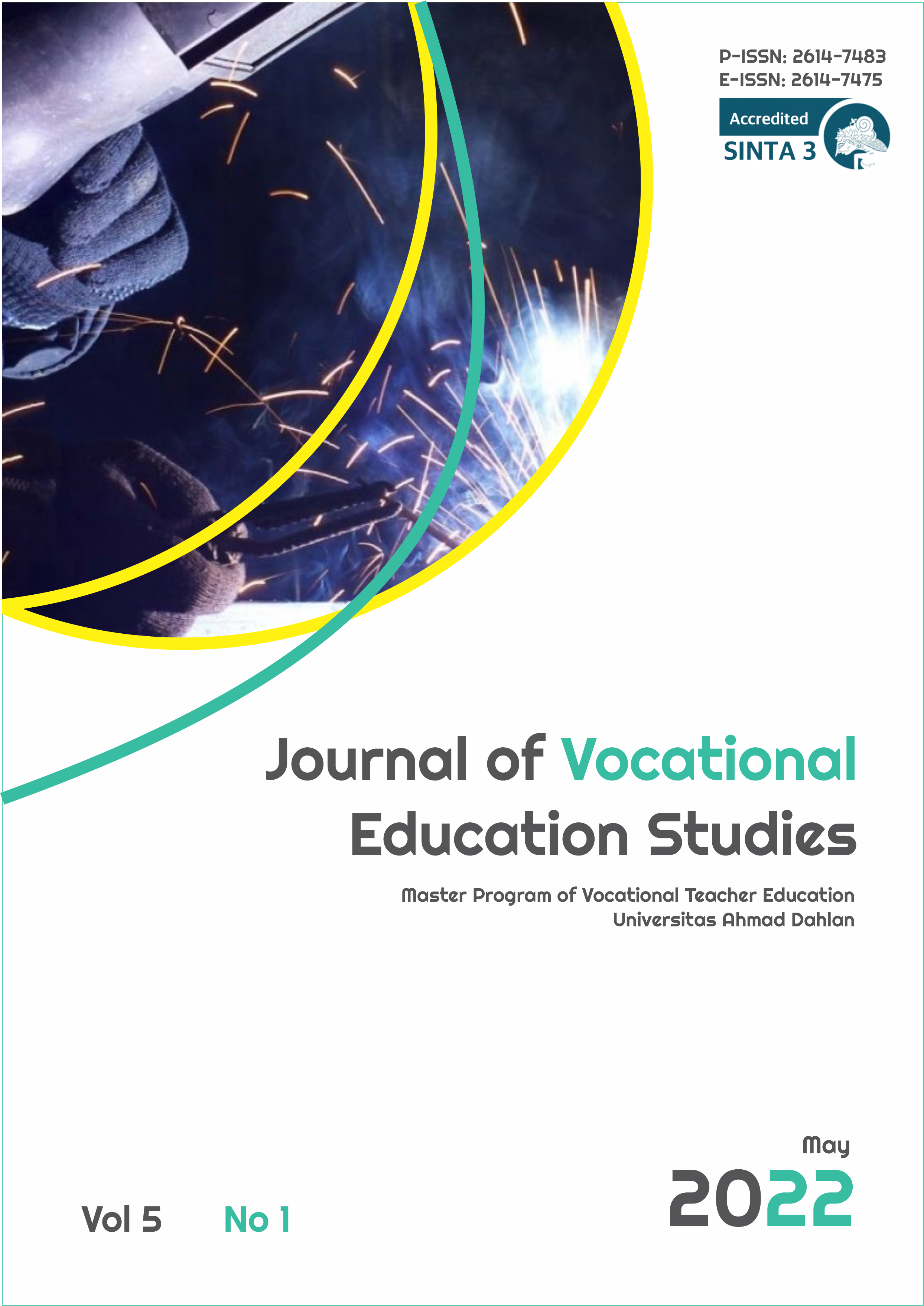Factors Affecting Graduate Competence in Independent Learning Policies Independent Campus
DOI:
https://doi.org/10.12928/joves.v5i1.5471Keywords:
Competence of Graduates, Emotional Intelligence, Learning Behavior, Academic AchievementAbstract
Learning in the Merdeka Campus provides challenges and opportunities for the development of innovation, creativity, capacity, personality, and student needs, as well as developing independence in seeking and finding knowledge through realities and field dynamics such as ability requirements, real problems, social interaction, collaboration, self-management, performance demands, targets and achievements. Through an independent learning program that is well designed and implemented, students' hard and soft skills will be formed strongly.The tight competition in the world of work entering the industrial era requires university graduates to compete by equipping themselves with various skills. The competence of college graduates is one of the determining factors to be able to compete in the world of work. Higher education graduates are mainly required to be up to date with the development of science and technology so that they can become graduates who are ready to use and are competitive. It is undeniable, with the advancement of science and technology, the roles and functions of humans have begun to be replaced by information technology that was created to simplify and accelerate human work. This study aims to analyze the factors that influence the competence of college graduates, namely emotional intelligence, learning behavior and academic achievement. Graduate competence refers to the Graduate Competency Standards according to the National Higher Education Standards, namely Attitudes, Knowledge and Skills. The scope of the research is final semester students at the Raflesia Polytechnic with 120 respondents. Data collection techniques using a Likert scale 1-5 questionnaire. The analysis used statistical tests, namely the F test and t test with the help of SPSS. The results showed that simultaneously emotional intelligence, learning behavior and academic achievement had a significant effect on graduate competence, while partially emotional intelligence and academic achievement had a significant effect on graduate competence
References
Ayu Desi Indrawati., Urged Ketut Sintaasih., Made Artha Wibawa., Ni Putu Santi Suryantini., (2013). Analysis of Determinants of Academic Achievement for Students of the Faculty of Economics and Business, Udayana University. Journal of the Faculty of Economics, Udayana University
Adjani, Sagita and Helmi Adam. (2013). Factors Affecting Student Academic Achievement in Introductory Accounting Courses. Student Scientific Journal of FEB Universitas Brawijaya. Vol. 1 No.1.
Iskandaryah, Doddy and Imam Ghozali. (2012). Analysis of Factors Affecting Student Achievement in Studying Intermediate Financial Accounting Courses, Empirical Studies on Regular Accounting Students at the Faculty of Economics and Business, Diponegoro University in 2009 and 2010). Diponegoro Journal of Accounting. Vol. 1 No. 2: Pg. 1- 13
Teuku Rijalul Fikry,. Maya Khairani. (2017). Emotional Intelligence and Anxiety of Thesis Guidance Students at Syiah Kuala University. Andi Matappa Counseling Journal Volume 1 Number 2 August 2017. Pages 108-115 p-ISSN: 2549-1857; e-ISSN: 2549-4279
Didik Prasetyo, Unti Ludigdo (2016). The Influence of Emotional Intelligence and Learning Behavior on Academic Achievement of Students of the Accounting Department, Universitas Brawijaya.Student Scientific Journal of the Faculty of Economics and Business Brawijaya Universityhttps://jimfeb.ub.ac.id/index.php/jimfeb/article/view/978
Linda Atik Rokhana., Sugeng Sutrisno (2016) The Effect of Emotional Intelligence, Learning Behavior and Interest in Learning on the Level of Accounting Understanding. (Empirical Study on Accounting Students, Faculty of Economics and Business UNTAG Semarang) Media Economics and Management Vol. 31 No. January 1, 2016
Law Number 12 of 2012 concerning Higher Education (State Gazette of the Republic of Indonesia of 2012 Number 158, Supplement to the State Gazette of the Republic of Indonesia Number 5336). 2.
Government Regulation Number 4 of 2014 concerning the Implementation of Higher Education and Management of Higher Education (State Gazette of the Republic of Indonesia of 2014 Number 16, Supplement to the State Gazette of the Republic of Indonesia Number 5500)
Ghozali, Imam (2016). Application of Multivariate Analysis SPSS 23Edition: 8Publisher: Diponegoro University Publishing Agency ISBN: 979-704-015-1
Goleman, Daniel (2015). Emotional Intelligence : Emotional intelligence why EI is more important than IQ, Jakarta: PT. Main Library Gramedia.
Howes and Herald. (1999). Emotional Intelligence (translation). Jakarta: PT Gramedia Pustaka Utama.
Usman, Uzer. (2000). Become a Professional Teacher. Bandung:PT. Rosdakarya Youth.
Suwardjono. (2004). Learning Behavior in Higher Education, Journal of Accounting, March edition, STIE YKPN: Yogyakarta.
Poerwadarminta WJS (1986). General Indonesian Dictionary. Jakarta: Balai Pustaka.
Sekaran, Uma and Roger Bougie, (2017), Research Methods for Business: Expertise-Development Approach, 6th Edition, Book 1, Second Printing, Salemba Empat, South Jakarta 12610.
-------------------------------------------------- --- (2017), Research Methods for Business: Expertise-Development Approach, 6th Edition, Book 2, Salemba Empat, South Jakarta 12610.
Sugiyono. (2016). Quantitative, Qualitative and R&D Research Methods. Bandung: PT Alphabet.
Budiaji, Weksi. (2013). Measurement Scale and Total Likert Scale Responses. Journal of Agricultural and Fisheries Sciences. (Vol. 2 No. 2 Hal : 127-133 ISSN 2302-6308).
Downloads
Published
Issue
Section
License
Copyright (c) 2022 Universitas Ahmad Dahlan

This work is licensed under a Creative Commons Attribution-ShareAlike 4.0 International License.
Authors who publish with Journal of Vocational Education Studies (JOVES) agree to the following terms: Authors retain the copyright and grant the Universitas Ahmad Dahlan right of first publication with the work simultaneously licensed under a Creative Commons Attribution License (CC BY-SA 4.0) that allows others to share (copy and redistribute the material in any medium or format) and adapt (remix, transform, and build upon the material) the work for any purpose, even commercially with an acknowledgement of the work's authorship and initial publication in Universitas Ahmad Dahlan. Authors are able to enter into separate, additional contractual arrangements for the non-exclusive distribution of the journal's published version of the work (e.g., post it to an institutional repository or publish it in a book), with an acknowledgement of its initial publication in Universitas Ahmad Dahlan. Authors are permitted and encouraged to post their work online (e.g., in institutional repositories or on their website) prior to and during the submission process, as it can lead to productive exchanges, as well as earlier and greater citation of published work (See The Effect of Open Access).










.png)



